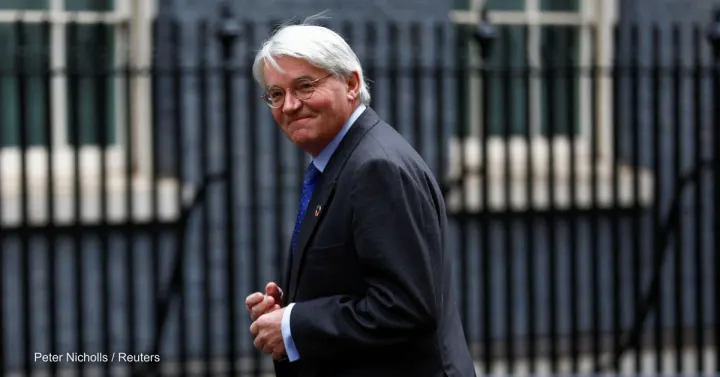The United Kingdom’s international development minister, Andrew Mitchell, has an “overarching ambition” of bolstering public support for development and has tasked the Foreign, Commonwealth & Development Office, or FCDO, to increase favorability ratings of the aid budget from the current 50% to 70%.
To help achieve this, Mitchell is rebranding the government’s aid work, which will now be called UK International Development, or UKID, to “make British leadership more identifiable at home and abroad,” he told Devex in an interview in his private office on Wednesday. “This is making the merger a success,” he added, referring to the government’s 2020 decision to fold the Department for International Development into the Foreign Office — a move that was controversial, including with Mitchell at the time.
Both moves represent a culmination of six months of work for Mitchell, a former DFID secretary who’s been in his current post for half a year. Mitchell previously fought then-Chancellor Rishi Sunak over his decision to cut the aid budget from 0.7% to 0.5% of national income in 2021.
With Sunak now the prime minister, the rebranding signals further shifts in the government’s approach to development policy. The announcements follow a new set of U.K. government development objectives released in March in the Integrated Review Refresh, the country’s foreign policy strategy.
Mitchell said he was “determined to win over the doubters” of international development and “drive up support to the 70-30 mark over the next 10 years,” which would require explaining what the FCDO does in “small towns and villages” in the U.K.
“We will persuade more people that international development is core to our own national interests as well as the right thing to do. We must show that we are being as transparent, accountable and efficient as possible in our spending,” said Mitchell.
“This is why we are launching this new brand UK International Development, to demonstrate U.K. development is broader than aid, and is ultimately about working with countries … by building mutually beneficial partnerships,” he added.
“Placing partnership at the heart of the U.K. offer shows that at its core, international development is not about charity, hands out and dependency. It’s about listening to our partners or working together in advance on our shared objectives,” Mitchell told Devex.
UKID’s new branding is accompanied by the tagline “partnership, progress, prosperity.” It will fulfill some of the functions previously carried out by DFID, but Mitchell said it was about maximizing the merger as opposed to resurrecting DFID.
“What you don’t want is every time there’s a change of government, DFID being born … it will take a very, very long time to make it effective. The officials who we will be seeking to retain and attract would throw up their arms in horror,” said Mitchell.
“The best thing to do is to make the structure inside the Foreign Office work for both development and foreign affairs. And that’s what I’m trying to do,” he added.
Mitchell said UKID could not be compared to previous development agencies housed in the Foreign Office, such as the Overseas Development Administration.
“We’re trying to have a structure which advances our twin aims of pursuing the climate change agenda, tackling poverty and promoting the SDGs in a modern way, which brings together the brilliance of the Foreign Office and the British international leadership on development and makes them work effectively,” he said.
The department is in the process of appointing a second top civil servant, known as a permanent under-secretary, dedicated to international development, who will receive annual targets for improving public support for international development — to be measured by specialist researchers in the Development Engagement Lab, who conduct polling.
“It’s clear from DEL research that a large portion of the British public has, as the Minister highlights, been left out of the discussion about the long-term and transformative benefits of development cooperation, particularly in the world’s poorest countries,” said David Hudson, co-director of the Development Engagement Lab and professor of politics and development at the University of Birmingham.
The UK government lays out its new development objectives
After Russia’s invasion of Ukraine, the UK government revisited its foreign policy strategy. The Integrated Review Refresh came with some wins for international development policy — and hints of further changes to the FCDO to come.
Jennifer Hudson, co-founder of DEL and professor of political behavior at the University College London, added: “From a public opinion perspective, the overwhelming majority of the British public believe that helping those in need overseas is the right thing to do, period. By uniting government efforts with NGO and private sector expertise to go out, listen and engage with the British public, the Minister is taking the right step toward tipping the scales in favour of UK international development.”
The “encouraging” announcements signaled “the coming of an approach that is a far cry from the chaos of recent years,” said Ian Mitchell, senior fellow and the director of development cooperation in Europe at the Center for Global Development.
“But unless Minister Mitchell is able to persuade the Chancellor to shift his position on funding hosting refugees out of the aid budget, these plans will come alongside further cuts; and the sincerity of the UK’s new commitments will be called into question. Tackling climate and food security for example needs finance as well as partnership.”

